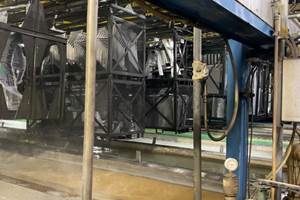The “Skills Gap” is Your Fault!
The disinterest of tomorrow’s workforce is your problem, too.
I admit to bristling a bit when I hear people use the term “skills gap.” It seems to have as many meanings as there are people you ask to define it. But define it how we will, the truth is that finishers can’t find enough of the skilled people they need to operate their businesses. Machine operators, industrial maintenance and chemical maintenance technicians, material movers and so on are all in short supply.
In need of a culprit, we blame today’s parents and the way their children are brought up. We blame educators and what they do and don’t teach their students. We blame a society that refuses to judge young people, and has thus created an entire generation that is unable to accept even the most constructive of criticism. But the fact is that we as finishing and industrial employers have a public relations issue that is contributing.
I began a recent presentation at a high school career day by asking the audience of juniors and seniors what came to mind when they considered potential employment in manufacturing. The answers? Long days, monotonous work, hot metal pouring into a cauldron, dark, dirty, hot buildings, layoffs, strikes and limited advancement opportunities. If that is the impression potential recruits have when they think of careers in our industry is it any wonder that we have a hard time filling the skills gap?
So while it’s easy to blame parents, schools and society for the lack of industrial talent, I contend that we must also look in the mirror. What if we are playing a major role in creating the gap? Is your organization guilty? Consider these questions:
Do you have a dead-end company culture? Have you created an environment of respect for your team members, valuing their input and giving them the latitude to learn from their own mistakes? Are they just punching a clock or do they feel like they work for an organization that genuinely cares about their well-being as individuals?
Have you ever traded layoffs for profit? When business slows, do you immediately cut staff, or do you look for ways to use the talents of your people until business picks up again? I acknowledge that in certain situations—the loss of a large customer or a fundamental and long-term shift in market dynamics—may make a layoff unavoidable. However, when we cavalierly slash payroll just for the sake of short-term profit, we send the message that ours is not a company that values either.
Is your plant “zero s” (the opposite of 5s)? When a potential employee visits your facility, do they see a clean, well-lit and organized environment where they would like to spend their day, or is it dark, greasy, dingy and depressing?
Do you expect experts from technical schools? When I graduated from business school, I was lucky if I knew 25 percent of what it would take to be successful in business. The rest I learned through employer-provided training, mentors, making mistakes and experience, one day at a time. When we hire a skilled employee with a degree from a technical school, we can’t expect them to perform at a level of someone who has been working in our plant for years. Have the patience to build on their basic skills and benefit from the head-start they have over everyone else that doesn’t have their level of training.
Have you gone back to school? Contact the guidance counselor or technical education instructor at your local high school. Selflessly offer your time to talk with students about careers with your company. Volunteer to speak to as many students as they will allow. Share the excellent opportunities in your company for skilled team members; jobs where they will be challenged, rewarded and where long-term prospects for employment are fantastic.
Has your high school visited you? When was the last time a local group of high school students visited your finishing operation to learn about what you do, meet your team members and consider a career in your company?
Have you mentored a high school student? Every chance I get, I take the opportunity to evangelize on the topic of careers in finishing and industry. As the finishing world evolves in the direction of analytics, robotics, automation, troubleshooting and PLCs, we are not the industrial companies of our fathers’ or grandfathers’ days. And that’s a good thing. Well over half our jobs require a significant level of knowledge and skill, so when the chance to bring a friend’s son or daughter to work along with me presents itself I jump at it, welcoming the occasion to share how rewarding our market can be.
Do you encourage your own children to consider careers in industry? Honestly? If our industry isn’t good enough for your kid, why is it good for anyone else’s?
How many examples can you share of members
of your leadership who were promoted from your
own ranks? There is a perception among many that jobs in the finishing industry are the dead-end type where employees are pigeonholed into spending a lifetime in the position in which they start. Are you creating pathways for team members interested in taking on more responsibility?
Are you sharing your story with state and local officials in a position to make a difference? I recently had a conversation with the leader of a finishing operation who lamented that his local high school’s technical education and STEM programs did little to produce students with manufacturing-applicable skills that would give them a leg up when joining his team. Guess what the answer was when I asked him if he had shared his concerns with his local school board?
Are you putting your money where your mouth is? Several owners of finishing and manufacturing companies are going way beyond just sharing information with local policy makers and actually participating in the funding of local technical programs, helping their school districts purchase equipment and add infrastructure.
There is no single solution to the complex mismatch between the huge number of open positions in manufacturing and the shortage of qualified candidates to fill them. However, before we point the finger elsewhere, let’s make sure we are not part of the problem.
Originally published in the December 2015 issue.
Related Content
Installing an Ecoat Line
Thinking of investing in electrocoating capabilities? George Lovell, coatings plant manager for Lippert, discusses considerations you should keep in mind as you add your ecoat line.
Read MoreFinishing Systems Provider Celebrates 150 Years, Looks to Future
From humble beginnings as an Indiana-based tin shop, Koch Finishing Systems has evolved into one of the most trusted finishing equipment providers in the industry.
Read MoreECOAT24 Attracts Both Serious Electrocoaters and Novices Alike
The conference, held April 2-4, 2024, in Orlando, Florida, provides the ecoating industry with educational sessions, supplier exhibits and networking with colleagues.
Read MoreMasking Solutions Provider CFS Dramatically Expands Capabilities and Capacity
Custom Fabrication & Supplies (CFS) completed a new plant expansion packing 10 times the capacity into twice the space. It dramatically enhances the supplier’s custom capabilities to provide extremely precise and cost-effective masking solutions.
Read MoreRead Next
Delivering Increased Benefits to Greenhouse Films
Baystar's Borstar technology is helping customers deliver better, more reliable production methods to greenhouse agriculture.
Read MoreEpisode 45: An Interview with Chandler Mancuso, MacDermid Envio Solutions
Chandler Mancuso, technical director with MacDermid Envio discusses updating your wastewater treatment system and implementing materials recycling solutions to increase efficiencies, control costs and reduce environmental impact.
Read MoreEducation Bringing Cleaning to Machining
Debuting new speakers and cleaning technology content during this half-day workshop co-located with IMTS 2024.
Read More












.jpg;maxWidth=300;quality=90)









